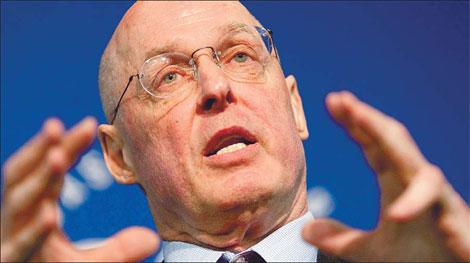
Henry Paulson, former US Treasury Secretary, said dialogue would help the two countries foster mutual understanding on disputed issues.[Agencies]
BEIJING - Bilateral relations between China and the United States continue to remain strong despite the recent tensions on the yuan issue, former US Treasury Secretary Henry Paulson said on Wednesday.Paulson said the US is grateful for China's responsible behavior during the crisis and its contribution to the anchoring of the US and world economy.
"I frankly believe the relationship between the two countries is strong," he told China Daily after a speech at Tsinghua University. "I see glasses half-full, not half-empty."
The two countries were recently bogged down in a dispute over the proper value of the yuan, with some US legislators and economists accusing China of manipulating the currency value to benefit its exports. They urged the US government to impose special tariffs on Chinese products exported to the US.
China, meanwhile, defended its foreign exchange rate policy, saying that the US trade deficit with China is a result of the international division of labor and its lack of competitiveness in manufacturing.
The yuan has risen by 21 percent against the dollar since July 2005, but the US trade deficit with China has not improved, which is proof that the currency value is not behind the US trade deficit, the Chinese side said.
Paulson implied that the tension was due to the global financial crisis, which has increased jobless rates in the US. "When there is an economic downturn in any country, you'll see quite naturally more protectionist or isolationist sentiment," he said. "It's always easier to come up with one thing to blame."
Paulson said the two countries should "run into the problem" instead of "running away from it", meaning they should conduct candid communication to iron out differences and seek mutual understanding.
"I think there are always going to be periods of tension from time to time. It's how you manage those tensions. I believe they are being well managed."
President Hu Jintao's conversation with US President Barack Obama last week over bilateral economic relations and the US Treasury's decision to delay release of its foreign exchange report, previously scheduled for April 15, which is expected to name China a currency manipulator, are all signs of tension easing between the two nations, said analysts.
Moreover, the two countries regularly hold economic and strategic dialogue, which was launched in 2006 and attended by high-ranking government officials of both countries, including Paulson when he was Treasury Secretary.
Paulson said the dialogue would help the two countries foster mutual understanding on disputed issues, including the yuan.
"The Strategic and Economic Dialogue is a mechanism that deals with tensions when they come up," he said. "How do you deal with tensions? You talk about it. It's got the mechanism to make progress in some of the really important longer-term issues."
Paulson, who is also honorary member of the Advisory Board of the School of Economics and Management at Tsinghua University, said he believes yuan appreciation is helpful for China's economic restructuring, but he would be "presumptuous" to give any concrete suggestions regarding the timing or pace of any yuan appreciation. "China is a sovereign nation," he said in his speech.





